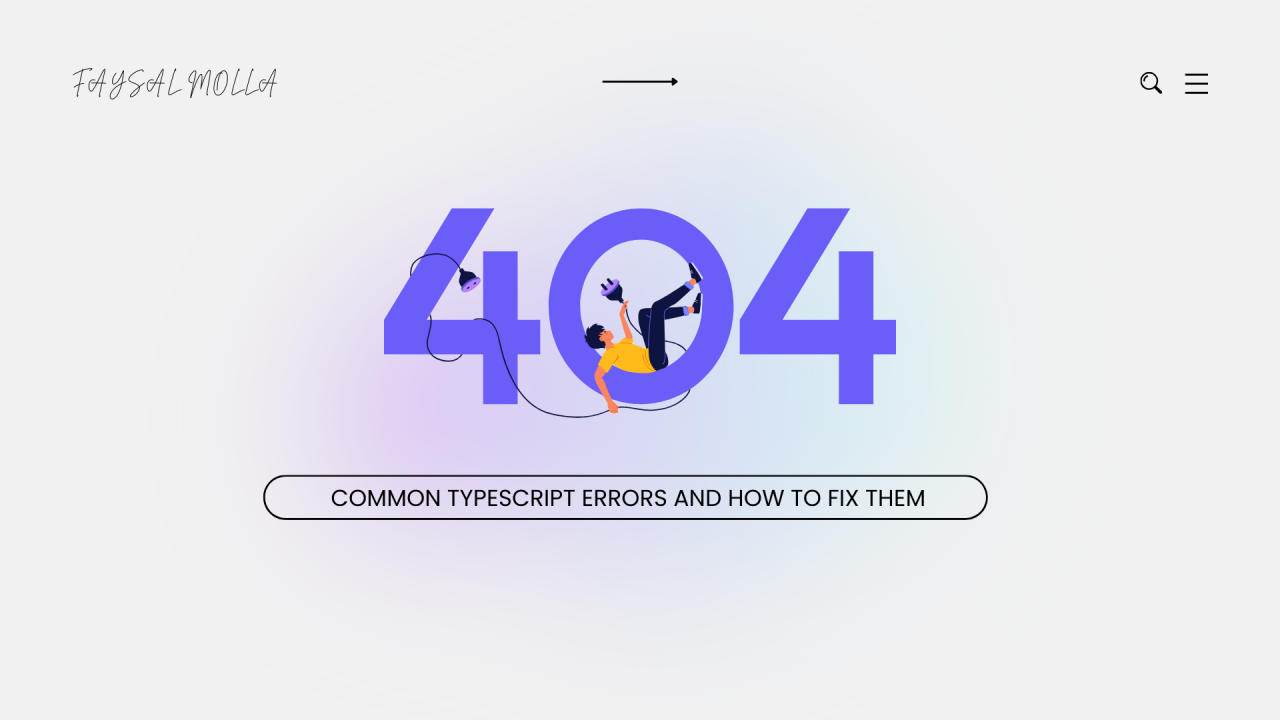
Common TypeScript Errors and How to Fix Them
Faysal Molla
Founder Of Qosprey Agency | Full MERN Stack JavaScript Web Designer And Developer
TypeScript, a powerful superset of JavaScript, introduces static types to enhance code quality and maintainability. While it offers numerous benefits, developers often encounter common errors when working with TypeScript. Understanding these errors and how to fix them is crucial for a smooth development experience. In this blog, we'll explore some of the most common TypeScript errors and provide solutions to resolve them.
1. Type 'undefined' is not assignable to type
Error Example:
let username: string;
username = undefined; // Error: Type 'undefined' is not assignable to type 'string'.
Cause: This error occurs when you try to assign undefined to a variable that expects a specific type, such as string or number.
Solution: Ensure that the variable is assigned a value of the correct type or modify the type to include undefined.
Fix:
let username: string | undefined;
username = undefined; // No error
2. Property 'xyz' does not exist on type 'abc'
Error Example:
interface User {
id: number;
name: string;
}
const user: User = { id: 1, name: 'Alice' };
console.log(user.age); // Error: Property 'age' does not exist on type 'User'.
Cause: This error occurs when you try to access a property that is not defined in the type.
Solution: Ensure that the property exists on the type or update the type definition to include the property.
Fix:
interface User {
id: number;
name: string;
age?: number; // Optional property
}
const user: User = { id: 1, name: 'Alice' };
console.log(user.age); // No error
3. Argument of type 'xyz' is not assignable to parameter of type 'abc'
Error Example:
function greet(name: string) {
console.log(`Hello, ${name}`);
}
greet(42); // Error: Argument of type 'number' is not assignable to parameter of type 'string'.
Cause: This error occurs when a function is called with an argument of the wrong type.
Solution: Pass an argument of the correct type or change the function parameter type.
Fix:
function greet(name: string) {
console.log(`Hello, ${name}`);
}
greet('Alice'); // No error
4. Type 'null' is not assignable to type 'xyz'
Error Example:
let email: string;
email = null; // Error: Type 'null' is not assignable to type 'string'.
Cause: This error occurs when null is assigned to a variable that expects a specific type.
Solution: Include null in the type definition or assign a value that matches the expected type.
let email: string | null;
email = null; // No error
领英推荐
5. Cannot find module 'xyz' or its corresponding type declarations
Error Example:
import * as moment from 'moment'; // Error: Cannot find module 'moment' or its corresponding type declarations.
Cause: This error occurs when TypeScript cannot find the type definitions for a module.
Solution: Install the type definitions for the module or create a custom type declaration.
//bash
npm install @types/moment --save-dev
//typescript
import * as moment from 'moment'; // No error
6. Type 'any' is not assignable to type 'never'
Error Example:
function processValue(value: never) {
console.log(value);
}
processValue(42); // Error: Argument of type 'number' is not assignable to parameter of type 'never'.
Cause: This error occurs when a value of type never is expected, but a different type is provided. The never type is often used to indicate that a function never returns or always throws an error.
Solution: Ensure that the function or variable is used correctly according to its intended type.
Fix:
function processValue(value: number) {
console.log(value);
}
processValue(42); // No error
7. Type 'void' is not assignable to type 'xyz'
Error Example:
function logMessage(): void {
console.log('Hello, world!');
}
const message: string = logMessage(); // Error: Type 'void' is not assignable to type 'string'.
Cause: This error occurs when a function that returns void is assigned to a variable expecting a different type.
Solution: Ensure that the function returns a value of the expected type or adjust the variable type accordingly.
Fix:
function logMessage(): void {
console.log('Hello, world!');
}
logMessage(); // No error
8. Type 'number' is not assignable to type 'string'
Error Example:
let age: number = 25;
let name: string = age; // Error: Type 'number' is not assignable to type 'string'.
Cause: This error occurs when trying to assign a variable of one type to another incompatible type.
Solution: Convert the value to the correct type before assignment.
Fix:
let age: number = 25;
let name: string = age.toString(); // No error
Conclusion
TypeScript errors can initially seem daunting, but they serve to guide developers towards writing more robust and maintainable code. By understanding the common errors and their solutions, you can effectively leverage TypeScript’s powerful type system to catch potential issues early and ensure your code is both reliable and easy to maintain. As you become more familiar with these errors and their fixes, your proficiency with TypeScript will grow, leading to a more efficient and enjoyable development experience.